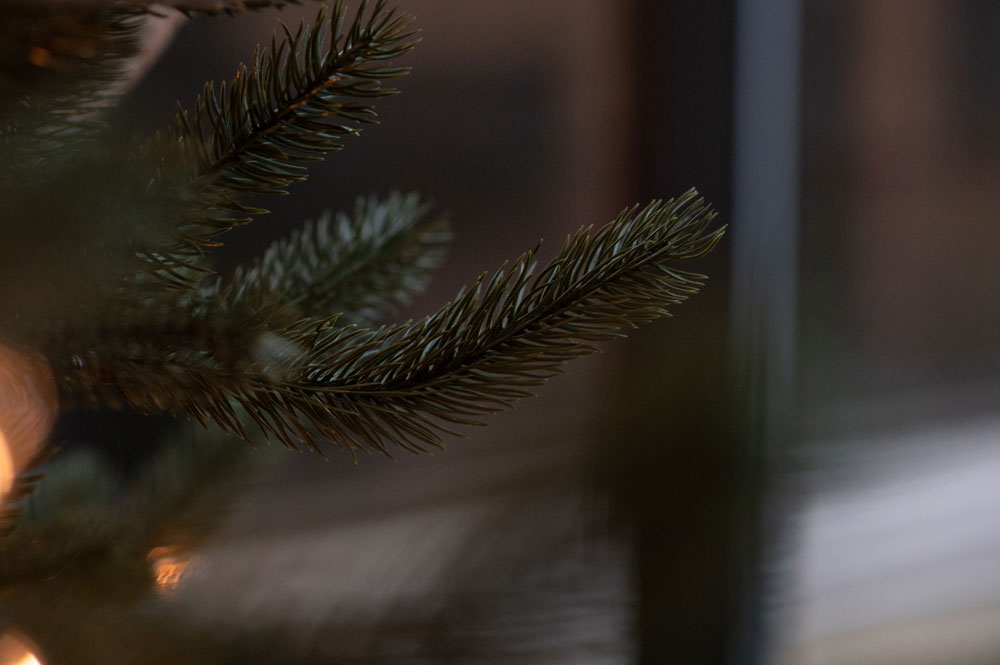For many years, our family tradition has been to hunt for a Christmas tree on the day after Thanksgiving. We brave the cold and examine tree after tree, looking for the perfect one for us. The branches are most important because they will hold lights and the ornaments that our family holds dear. Tree branches and Advent are connected. God used the image of a branch in his Word when the prophets predicted the coming Messiah.
The Branch King is prophesied (11:1).
In the eleventh chapter of Isaiah, God compares his messianic kingly line to a tree whose root was named “Jesse,” David’s father. God had made a covenant to David (2 Sam. 7) that someday in the future a descendant of his family would have his throne established forever. The kingdom of David should have been a big, beautiful tree, but because of the disobedience of Davids’ descendants, it is pictured instead here as a stump. But Isaiah says in this verse that there’s still life in the stump, and God promises that the “king tree” will grow back again: “There shall come forth a shoot from the stump of Jesse, and a branch from his roots shall bear fruit.” (11:1)
Isaiah calls this new baby who will be born in Bethlehem “the Branch.” The Hebrew word for “branch” is “netzer.” That’s where we get the name “Nazareth.” Have you ever heard of that city? Of course! Matthew 2 says that Jesus “went and lived in a town called Nazareth. So was fulfilled what was said through the prophets, that he would be called a Nazarene ” (2:23). Jesus, the Branch, lived in Branchville!
Next, Isaiah describes what this Branch King will do (2–10).
Verse 2 says, “And the Spirit of the Lord shall rest upon him, the Spirit of wisdom and understanding, the Spirit of counsel and might, the Spirit of knowledge and the fear of the Lord.” We see this very clearly in the gospels. Jesus did miracles and taught about God’s kingdom with the power of God’s Spirit. Again, we have more evidence that Jesus is the fulfillment of this passage.
But if we expect that Jesus fulfilled this passage in its entirety during his first advent, the next few verses provide a problem:
“And his delight shall be in the fear of the Lord. He shall not judge by what his eyes see, or decide disputes by what his ears hear, but with righteousness he shall judge the poor, and decide with equity for the meek of the earth; and he shall strike the earth with the rod of his mouth, and with the breath of his lips he shall kill the wicked. Righteousness shall be the belt of his waist, and faithfulness the belt of his loins” (11:3-5).
Isaiah says this Branch King will bring perfect justice when he comes to earth. But there wasn’t perfect justice when Jesus was on earth years ago, was there? There’s no perfect justice now, is there?
So, we have to decide: Either Jesus of Nazareth was not the true shoot of Jesse, or Jesus must be coming to earth again. And considering many other passages of Scripture (including Jesus’ own words), we would be wise to believe that he will fulfill this prophecy in full when he returns to earth.
His first coming was in Bethlehem. That’s what we celebrate every year on December 25. We celebrate the incredible gift God gave us his Son to earth to be born as a baby, die for our sins, and rise again. The second time Jesus will come is in the future. It hasn’t happened yet, but it will. Since God’s promise of Jesus’ first coming really happened, we can have hope that God will keep his promise about Jesus’ second coming.
Next, Isaiah says that the Branch King will rule over an amazingly safe new earth (6–8).
“The wolf shall dwell with the lamb, and the leopard shall lie down with the young goat, and the calf and the lion and the fattened calf together; and a little child shall lead them. The cow and the bear shall graze; their young shall lie down together; and the lion shall eat straw like the ox. The nursing child shall play over the hole of the cobra, and the weaned child shall put his hand on the adder’s den.” (11:6-8)
Kids usually don’t play with snakes! In The Lion King, all the animals are trying to live in peace. But Isaiah is talking about something even better, just like the way things were in Garden of Eden.
Why will this happen? Isaiah says in the next verse, “They shall not hurt or destroy in all my holy mountain; for the earth shall be full of the knowledge of the Lord as the waters cover the sea” (11:9).
Everyone on earth will know God in a personal way. No more sin, no more temptation, no more bad people, no more Satan. God will fill the world with himself! Isn’t that an amazing future to look forward to?
In that future time, Jesus will be king over all people.
The Shoot and the Root of Jesse brings hope for all people.
“In that day the root of Jesse, who shall stand as a signal for the peoples—of him shall the nations inquire, and his resting place shall be glorious” (11:10).
Isaiah calls the Branch King “the root of Jesse” (David’s father). Jesus is both the shoot (who comes from David) and the root (who was before David). His people will not only be the people of Israel, but also the Gentiles.
Isaiah also says that “the nations will inquire of him.” What does that mean? The apostle Paul explains it in Romans 15:
“For I tell you that Christ became a servant to the circumcised to show God’s truthfulness, in order to confirm the promises given to the patriarchs, and in order that the Gentiles might glorify God for his mercy. As it is written . . . ‘The root of Jesse will come, even he who arises to rule the Gentiles; in him will the Gentiles hope’” (8–9, 12).
Isaiah predicted what we’re doing now: giving glory to God as we put our hope in Christ! Isn’t that great that we can put our hope in Jesus now, even before he comes again?
How should we understand these promises?
These promises in Isaiah are separated by time. This is called “prophetic perspective:” The Old Testament gives us a front view of the promises. But the New Testament explains more and gives us the real view of the promises.
We’re living with hope in between God’s promises: We look back and see how God has kept his word, and we look ahead and know that God will keep his word!
We have hope at Christmas because some of Isaiah’s promises came true when Jesus came the first time at Christmas.
- He lived in Branchville (Nazareth).
- He had God’s Spirit on him.
- The Gentiles are putting their hope in him.
We also have hope at Christmas as we look forward to the other promises that will come true when Jesus comes again.
- In that day, Jesus will bring total justice to the earth (11:4).
- In that day, nature will be peaceful (11:6–8). Isaiah later used the same wording in 65:25: “The wolf and the lamb will feed together, and the lion will eat straw like the ox.” This will be “the new heavens and a new earth” (65:17).
- In that day, “the earth shall be full of the knowledge of the Lord as the waters cover the sea” (11:9).
It’s often easy to borrow trouble from tomorrow. But let’s borrow hope from tomorrow instead. Our future hope should be today’s hope. As you look at your Christmas tree this December and see the lights, the ornaments, and the presents, don’t forget to notice the branches. Remember that Jesus is the Branch King, who is our hope today and our hope for the future!





